
 Rolf Klep at the entrance to the maritime museum (now Clatsop County Historical Society) in September of 1967. The Museum hosted the first Regional Seminar of Historical Administration , guests included staff from the Oregon Historical Society. Columbia River Maritime Museum Collection.
Rolf Klep at the entrance to the maritime museum (now Clatsop County Historical Society) in September of 1967. The Museum hosted the first Regional Seminar of Historical Administration , guests included staff from the Oregon Historical Society. Columbia River Maritime Museum Collection.
From the Wheelhouse
History will be preserved where it was made.
For most ofus, an appreciation of historic events is somehow easier to grasp on the site where those events occurred. In that regard, the location of the new museum is significant. From the buildings observation windows, future visitors will view the Columbia River from Tongue Point to the Pacific Ocean, ten miles distant. It is a panorama full of history.
Across the river is Bakers Bay, where Captain Robert Gray anchored his ship Columbia Rediviva in 1792. Lewis and Clark led their weary party past here in 1805, and in 1811, the ship Tonquin, sent by John Jacob Astor, anchored only a few hundred yards from this spot to establish a fi,r trading station called Astoria. Where piling and fill now support the Museum building, was once a small bay overlooked by the original settlement. Trading vessels rode at anchor here while calling at the fort. In later years the old Oregon Railway & Navigation Company dock occupied the site, serving the sternwheelers and ocean steamers of the Union Pacific system for over half a century.
Along the Columbia River, there are few locations that have witnessed so much of the unfolding of the region:~ history. It is wholly appropriate that the Museums new building is occupying this rich site. History will be preserved where it was made.
These words were written by Rolf Klep 3 7 years ago as he dreamed of a new museum building on the shore of the Columbia River.
Today we see that vision has come true through the support, dedication, and undaunting drive of our supporters, near and far, Museum members such as yourself.
Founder Rolf Klep always held that the
Museum must constantly push forward to be the best possible institution of its kind.
From nothing more than a dedicated group of volunteers meeting fifty years ago, the Columbia River Maritime Museum has become one of the finest museums in the nation.
We are one of the most visited history museums in the state, the official maritime museum of the state of Oregon, and the first museum in Oregon to be awarded national accreditation, a proud heritage indeed.
Klep always believed that the Museum would become one of the finest collecting institutions in the region. We have stayed true to this mission. With a collection now numbering over 40,000 artifacts, and a library holding over 9,000 volumes, we have become a major center of preservation for the rich heritage of the Pacific Northwest.
As we look forward to the next fifty years I am honored and humbled to be a part of such a strong heritage, a history well preserved.
Our voyage has only just begun. Great changes are ahead of us, including the restoration of the Astoria Railroad Depot and its transformation into a Maritime Educational Center. Together we will explore new waters and discover new lands.
Executive Committee
H. Roger Qualman, Chainnan
Helena Lankton. Vice Chainnan
Bruce Buckmaster, Treasurer
Capt. Thron Riggs, Secretary
Thomas V. Dukich,
Immediate Past Chairman
Ward Cook, Advisor
George Beall, Advisor
Donald Magnusen, Advisor
Sam Johnson, Executive Director
Trustees
Rick Anderson
Dale FaJT
Cheri Folk
Jerry Gustafson
Michael Haglund
Dennis Hall
Ted Halton, Jr.
Don Haskell
Bill Henningsgaard
David Hill
Senator Betsy Jolrnson
Dr. Russell Keizer
S . Kenneth Kirn
Irene Martin
James McClaskey
Prudence Miller
David Myers
LaJTy Perkins
Capt. Jim Richards
Jeanyse Snow
Mike Sorkki
June Spence
Guy Stephenson
Bill Stevens
Charles J. Swindells
Shawn Teevin
Bill Wyatt
Trustee Emeritus
Peter Brix
Richard Carruthers
Walter Gadsby, Jr.
Alan Goudy
Louis Larson
Advisory Trustees
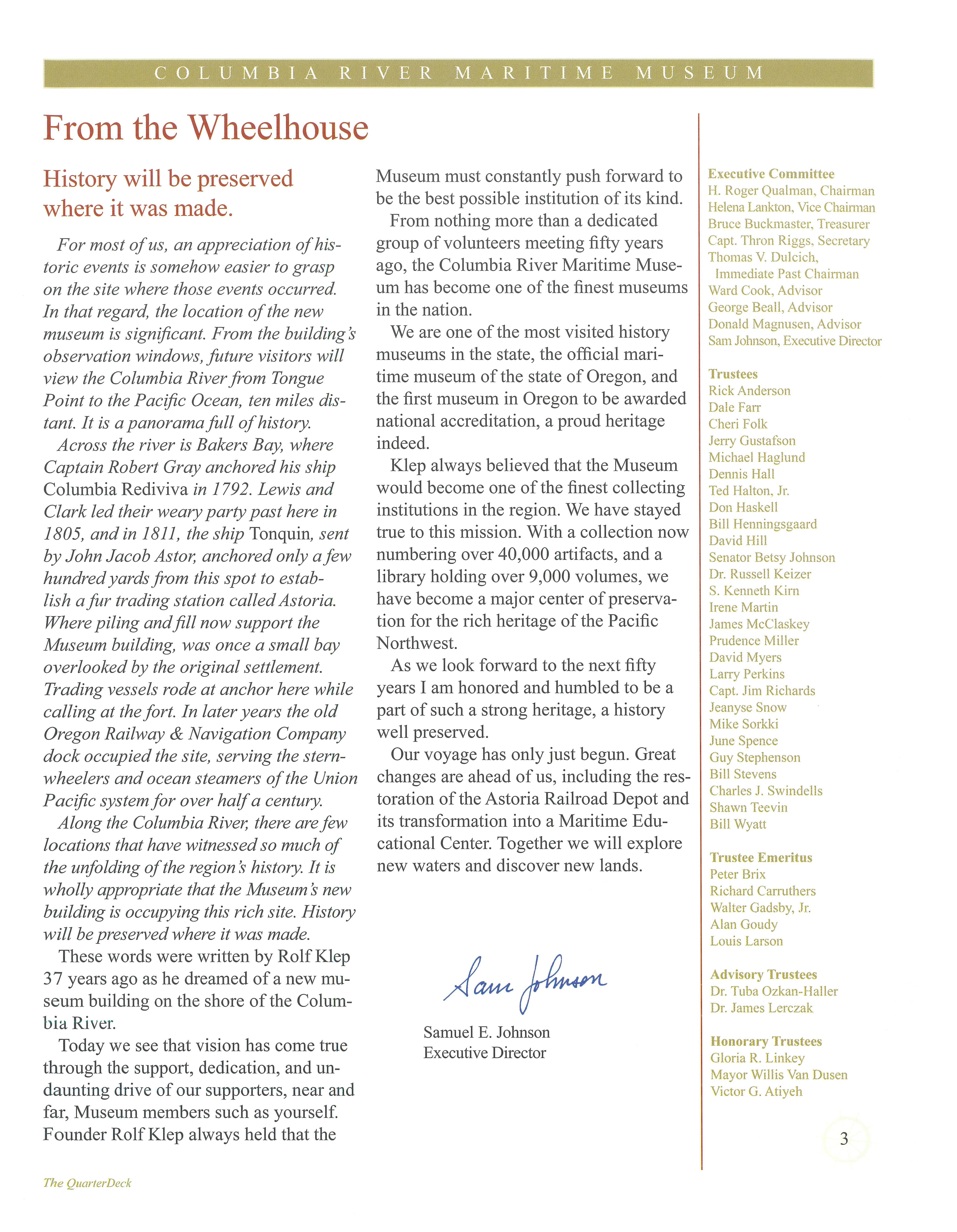
Dr. Tuba Ozkan -Haller
Dr. James Lerczak
Samuel E. Johnson Executive Director
Honorary Trustees
Gloria R. Linkey
Mayor Willis Van Dusen
Victor G. Atiyeh
COLUMBIA RIVER MARITIME MUSEUM
The QuarterDeck
3
COLUMBIA RIVER MARITIME MUSEUM
Before construction of the Museum, RolfKlep traveled the world v isiting the finest maritime museums and brought back the best ideas for Astoria .
Here he is seen with Sven Molang, Director of the Norsk Sjofartsmuseum (the Norwegian Maritime Museum) , at the International Congress of Maritime Museums Annual Meeting in Oslo , 1975. Columbia River Maritime Museum Collection
Illustrated by
for
Museum Founder Rolf Klep
"I've been a wharf rat all my life," said Rolf Klep in explaining his role as the President and founder of the Columbia River Maritime Museum.
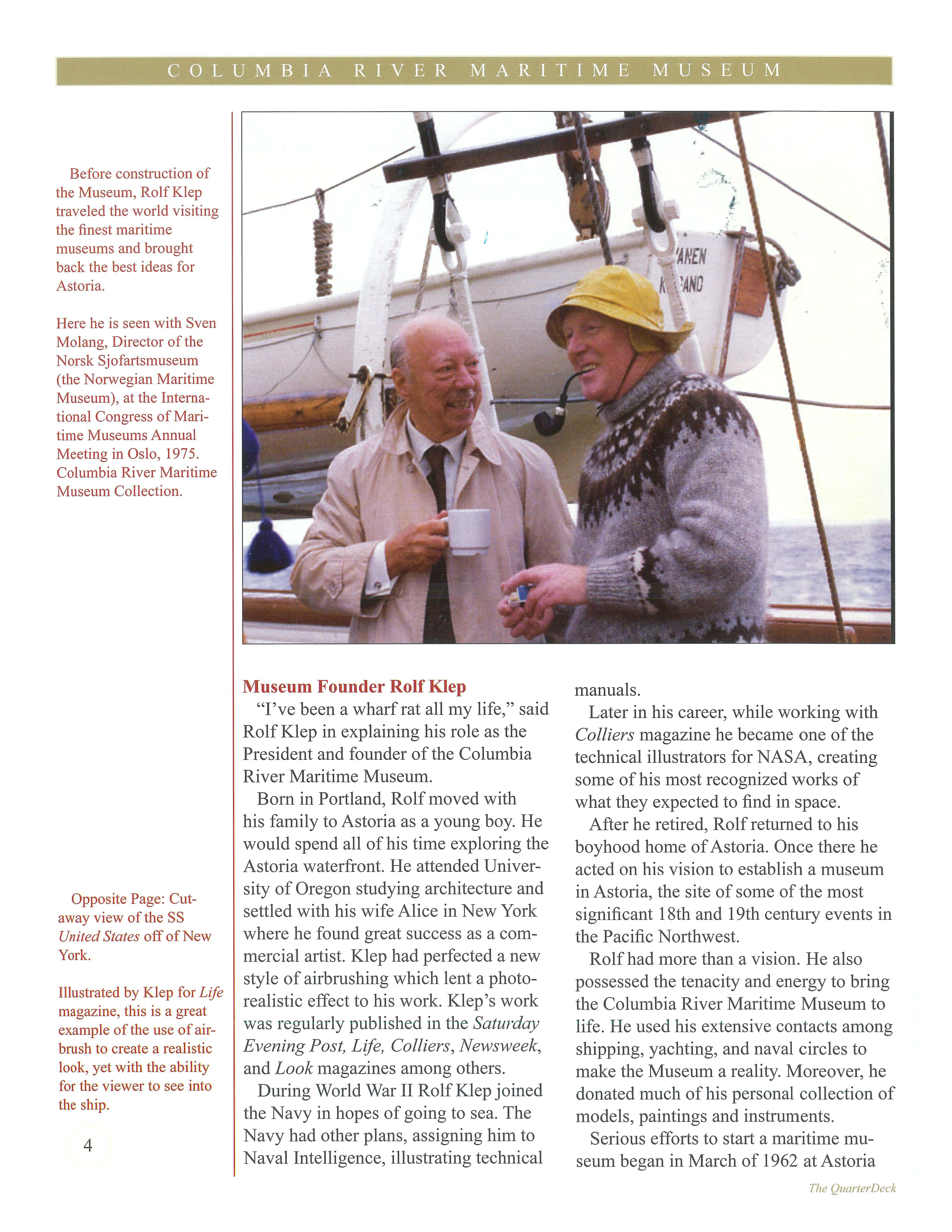
Born in Portland, Rolf moved with his family to Astoria as a young boy. He would spend all of his time exploring the Astoria waterfront. He attended University of Oregon studying architecture and settled with his wife Alice in New York where he found great success as a commercial artist. Klep had perfected a new style of airbrushing which lent a photorealistic effect to his work. Klep's work was regularly published in the Saturday Evening Post, Life, Colliers, Newsweek, and Look magazines among others .
During World War II RolfKlep joined the Navy in hopes of going to sea . The Navy had other plans, assigning him to Naval Intelligence, illustrating technical
manuals.
Later in his career, while working with Colliers magazine he became one of the technical illustrators for NASA, creating some of his most recognized works of what they expected to find in space.
After he retired, Rolf returned to his boyhood home of Astoria . Once there he acted on his vision to establish a museum in Astoria, the site of some of the most significant 18th and 19th century events in the Pacific Northwest.
Rolf had more than a vision. He also possessed the tenacity and energy to bring the Columbia River Maritime Museum to life . He used his extensive contacts among shipping, yachting, and naval circles to make the Museum a reality. Moreover, he donated much of his personal collection of models , paintings and instruments
Serious efforts to start a maritime museum began in March of 1962 at Astoria
Opposite Page: Cutaway view of the SS United States off of New York .
4
Klep
Life magazine, this is a great example of the use of airbrush to create a realistic look, yet with the ability for the viewer to see into the ship.
The Quar/erDeck
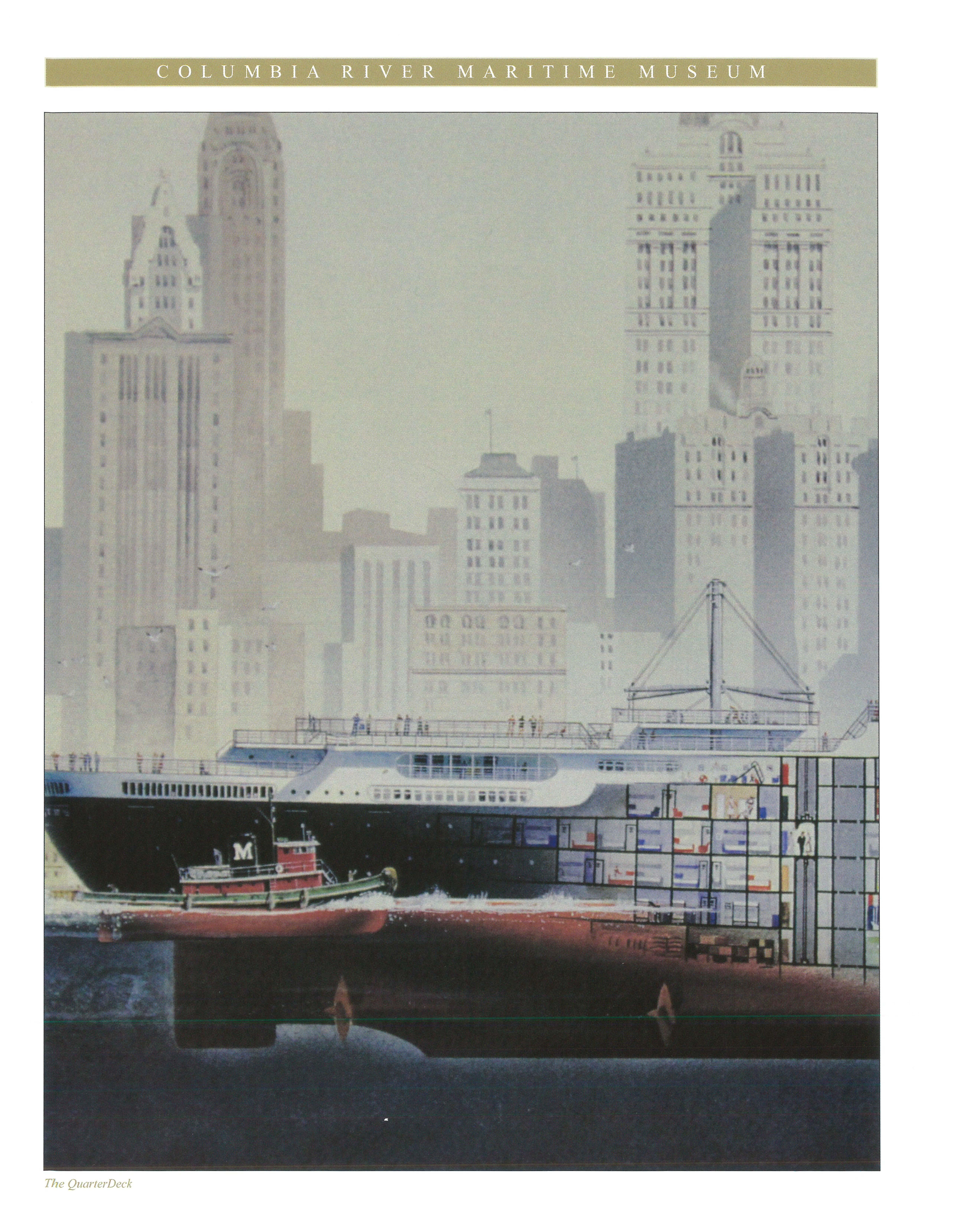
The QuarterDeck
COLUMBIA RIVER MARITIME MUSEUM
RolfKlep in the Navy, 1943. Columbia River Maritime Museum collection.
when Rolf Klep formed an organizing committee Articles of Incorporation were filed on May 11, 1962 by RolfKlep, Rear Admiral David L. Roscoe , Jr. USN (retired), and Joseph M. Dyer, then President of Astoria Marine Construction Company This date coincided with Captain Gray locating the entrance of the Columbia River in 1792.

The Dream becomes Real
The Museum leased its first building, Astoria's old City Hall , in 1962. This handsome building, constructed in 1905, housed the Museum until 1982, when the current site opened Establishing a maritime park, moorage, and a permanent home on the banks of the Columbia River was a goal envisioned by Klep from the very beginning.
The First Steering Committee
In March of 1962 the very first steering committee of the Maritime Museum Project held a meeting in the J. J. Astor Hotel. The Chamber of Commerce had arranged the meeting to help build support for the idea of a museum. Iu addition to RolfKlep and John Norris of the Chamber, the very first steering committee members included : Captain Jack DeSassise, vice-chairman; Allen Cellars, Hiram Johnson, Mrs. Alta Schalk, George Fulton, Fred Andrus, Admiral David Roscoe, A E. Grimstad, Eben Carruthers, Eli McConkey, Joseph M. Dyer, Harry Swanson, Don Mitchell, Paul Tolonen, and Erik Hauke .
MARITIME
COLUMBIA RIVER
MUSEUM
6
The QuarterDeck
COLUMBIA RIVER MARITIME MUSEUM
Colliers magazine illustrators and scientists from NASA. Rolf Klep is on far left. Dr Wernher von Braun is fourth from left. Columbia River Maritime Museum collection.
Detail of Klep 's work for NASA illustrating a concept of a Space Module Co lumbia River Maritime Museum collection.
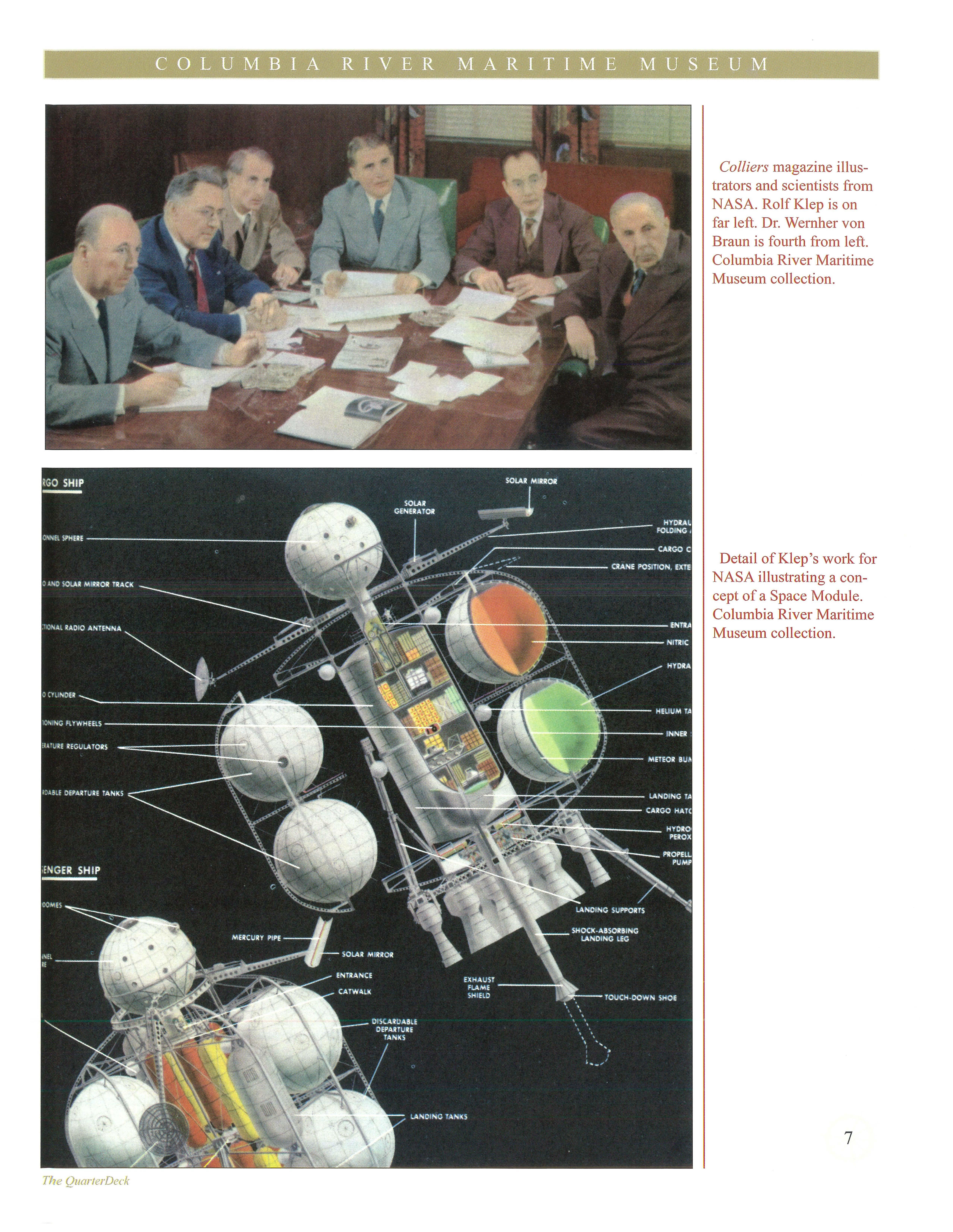
The Qua,-ferD,xk
7
COLUMBIA RIVER MARITIME MUSEUM
Young visitors play on the anchor outside the original museum.
For over 50 years the anchor has been a favorite of young mountaineers.
Cartoon from the Columbia Press, August 22 , 1968. RolfKlep was well known throughout the region as an avid collector of maritime objects for his new museum. Columbia River Maritime Museum collection.
By the 1970s the limitations of the old City Hall had become critical, the Museum had continued to grow in popularity and had over 50,000 visitors a year. The collection literally overflowed the building, and the Museum reluctantly stored boats, engines and other large items in borrowed space.
Site preparation began in the spring of 1973 at 18th and Marine Drive. Construction of a building conceived by Rolf Klep and designed by Astoria architects Brown, Brown and Grider began in May of 1975. In 1979, the Museum received several large grants which made it possible to complete the building and prepare the exhibits.
The opening celebrations on May 11, 1982 marked the Museum's 20th anniversary and the 190th of Gray finding the Columbia River.
The Museum would again celebrate a
successful complete remodel and expansion of the building in 2002, introducing innovative new exhibits, an orientation theater, and new library.
Since its inception, the Museum's accomplishments are many. In 1972 the Museum was accredited by the American Association of Museums. The Columbia River Maritime Museum was the very first museum in the State of Oregon to be accredited. Even today this distinction of national accreditation is held by only six museums in the state .
The Collections
The Columbia River Maritime Museum has one of the most significant maritime history collections in the Pacific Northwest. It consists of over 40,000 artifacts, 19,000 photographs, and over 9,000 books, journals and logs. The collection focuses primarily on the Northwest Coast (Continued on page 13 ... )

8
The QuarlerDeck
TV&VACATIO GUIDE INSID
RolfKlep in

1968 • E COLUMBIA RIVER MARITIME MUSEUM VOL. 43 - NO. 34 - PRICE 10c
• ...
•
"I've been a wharf rat all my life"
explaining his role as the founder of the Columbia River Maritime Museum.
"Mr. Klep of our Maritime Museum wants to know if your anchor is spoken for yet?"
The QuarterDeck
COLUMBIA RIVER MARITIME MUSEUM
The final concept drawing of the new Museum illustrated by Klep. He had created many different concepts, th is image is still amazingly accurate in many details today.
Columbia River Maritime Museum collection
Rolf Klep views one of the first logos for the Museum. Klep designed all of the logos, most still in use today. This design is now used for the Museum's house flag. Columbia River Maritime Museum collection.
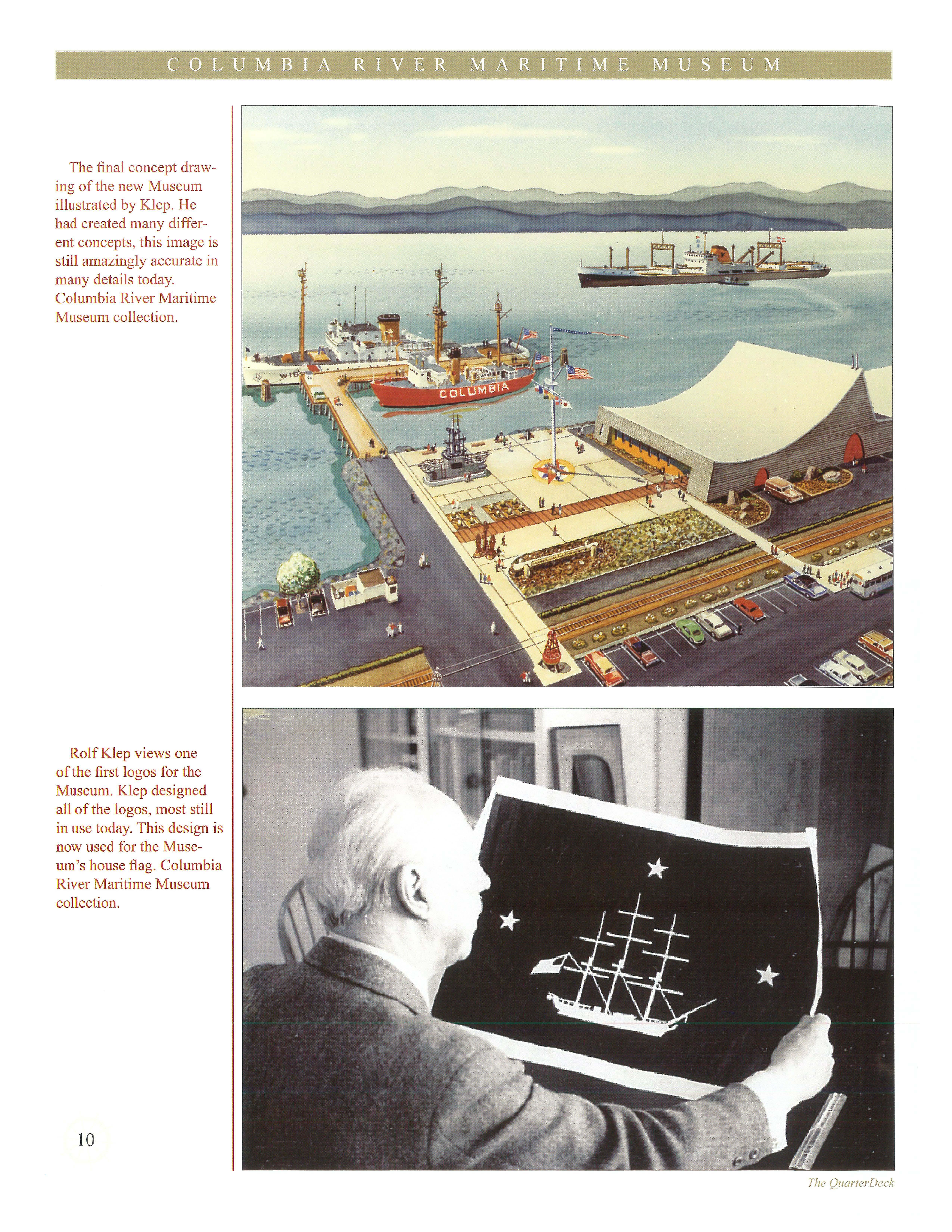
10 The QuarterDeck
COLUMBIA RIVER MARITIME MUSEUM
Construction of the Great Hall, looking east. The bridge of the Destroyer USS Knapp, which was set in place before construction, can be seen on the right.
Columbia River Maritime Museum collection
The new Museum w ith construction well underway. Columbia River Maritime Museum collection.

The QuarterDeck
11

RITIME MUSEUM The QuarterDeck
and the Columbia River, from prehistoric times to present.
The largest artifact in the Museum's collection is the former Coast Guard lightship Columbia (WLV-604). Columbia spent her entire career as the lightship at the mouth of the Columbia River, was decommissioned in 1979 and became an exhibit at the Museum in 1980.
Other major artifacts include the bridge to the destroyer USS Knapp, The US Coast Guard Motor Lifeboat 44300, the Astoria built troller Darle, and the Pilot Boat Peacock, now on proud display at the entrance to the Museum campus.
One of the Museum's important functions is to maintain a maritime library, which has grown into one of the finest libraries of its type in the country. A vast collection of ship's logs, ship's records and other original material as well as a comprehensive reference section make up just part of over 9,000 volumes now
contained in the Library.
With artifact donations continuing at a rate of over 100 per year the Museum's collections continue to grow in significance.
In the past 50 years the Museum has become one of the top maritime museums in the country and the pride of all.
Rolf Klep in front of the new Museum as construction nears completion. This is one of the last photos ofKlep in the Museum collection; he became ill and passed away in late 1981, sadly just months before the opening of the new museum.
Columbia River Maritime Museum collection.
Opposite page : The Great Hall of the Museum under construction in February, 1977. The old mezzanine windows can be seen on North wall of building. They were replaced with large windows overlooking the river in 2002.
Columbia River Maritime Museum collection.

COLUMBIA RIVER MARITIME MUSEUM
The QuarterDeck
13
The QuarterDeck
Special Edition
Fal!2012
The QuarterDeck is published by the Columbia River Maritime Museum, 1792 Marine Drive, Astoria. Oregon 97103. Tel: (503)325-2323

Fax: (503)325-2331
www.crmm.org
Editor: David Pearson
Editorial Staff
Blue Anderson
Betsev Ellerbrock
Julie Flues
Jeff Smith
Printed by Printgraphics Beaverton, Oregon
Museum Timeline
1962
The Columbia River Maritime Museum is incorporated on May 11th by a group of maritime enthusiasts, led by Rolf Klep , and leases it first facility in the old Astoria City Hall.
1963
Museum opens its doors for visitors in July
1964
The Museum acquires Lightship Columbia No 88 in Seattle and sails her home to Astoria.
1965
The City of Astoria , Port of Astoria, Clatsop County, and Columbia River Maritime Museum create the John Jacob Astor Maritime Park at the foot of 17th Street in Astoria
1968
The 17th Street Dock is built by the city for the Lightship Columbia.
1972
The Museum is the first museum in Oregon to receive accreditation by the American Association of Museums
1973
Site preparation begins for the new Columbia River Maritime Museum building
1974
The Museum begins planning a 42 ,000-square foot waterfront facility.
1975
Construction of the new building on the waterfront begins
1977
Homer Shaver awarded the first Fellow of Maritime History Award from Museum.
1980
Lightship Columbia WLV-604 arrives at the Museum , replacing Columbia No. 88.
1982
The new Museum building opens on the current site May 11th.
The new Columbia River Maritime Museum building opens to rave reviews.
1989
The trailer park in front of the Museum is purchased for the Museum parking lot.
1991
The Museum is recognized as the official Oregon state Maritime Museum. The Lightship Columbia is placed on the National Historic Register.
1992
The Museum celebrates the bicentennial of Captain Robert Gray's historic entry into the Columbia River
Thomas Vaughan awarded the Fellow of Maritime History Award from Museum
1993
Museum staff grows to 21 full-time employees and more than 100 volunteers
Hewitt Jackson awarded the Fellow of Maritime History Award from Museum .
COLUMBIA RIVER MARITIME MUSEUM
14
The QuarterDeck
COLUMBIA RIVER MARITIME MUSEUM
Dennis Noble awarded the Fellow of Maritime Jack Dant awarded the Fellow of Maritime History History Award from Museum. Award from Museum.
1995
1996
The Master Planning process begins for a major expansion with National Endowment for Humanities support.
1997
The Museum holds its first Strategic Planning Retreat.
1998
The Museum Master Plan is completed
USS Missouri visits Astoria, Museum hosts deck tours of ship for 50,000 visitors in one week.
Monte Markham awarded the Fellow of Maritime History Award from Museum
1999
HMS Endeavor visits the Museum for tours .
2000
The remodel of the Museum begins
2002
The Museum purchases the Armory. The remodel of the Museum is completed and the grand reopening is held on May 11th.
2003
Remodel of Armory first floor is completed.
The Council of American Maritime Museums holds its annual meeting at the Museum lhe QuarterDeck

2004
Peter Brix awarded the RolfKlep Award of Excellence
2007
Museum expands parking lot to Depot. Oregon Museums Association holds its annual conference at the Museum.
2008 Executive Director
Jerry Ostermiller retires after 20 years of service to the Museum. Awarded the Fellow of Maritime History Award from Museum.
2009
Samuel Johnson is hired as Executive Director. The boat documentation program is established
2010
The new exhibit Crossing the Bar: Perilous Passage is installed.
The Pilot Boat Peacock is placed on display on Museum campus, in a dynamic out of the water display.
2012
Restoration of the Astoria Train Depot begins to create the Barbey Maritime Center for Research & Industry.
The Columbia River Maritime Museum celebrates 50 years of operations, and looks forward to the next 50 years
Museum Staff:
Blue Anderson
Iliana Arroyo
Celerino Bebefoni
Ron Becerra
Ann Bronson
Betsey Elferbroek
Julie Flues
Helen lion!
Eileen Houchin
Jim Grey
Kathy Johnson
Sam.Johnson
Karen Sexton-Josephs
Arline LaMear
Misty O'Brien
David Pearson
Nathan Sandel
Hampton Scudder
Carol Shepherd
Jeff Smith
Nicole Spence
Aaron Stinnett
Patric Valade
Genia Jim Wormer
15
The Museum Today
Mission Statement
The mission of the Columbia River Maritime Museum is to collect, preserve, display, and interpret the maritime history and culture of the Columbia River and the waters of the North Pacific for the education and enjoyment of the public.
History
The Columbia River Maritime Museum was established in Astoria on May 11, 1962 by Rolf Klep and a group of supporters. It first occupied the Astoria City Hall (now the Clatsop County Historical Society). It moved to its present site on the bank of the Columbia River in 1982. The Columbia River Maritime Museum was the first museum in Oregon to be accredited by the American Association of Museums and is the State of Oregon's Official Maritime Museum.
Staff & Organization
24 staff (16 full-time, 8 part-time) Executive Director & Deputy Director, Managers: Facilities, Education, Store & Visitor Services, Membership, Curatorial, Finance.
Governance
The Museum's Board of Trustees includes 35 trustees serving 3-year renewable terms, plus 6 Trustee Emeritus, 2 Advisory Trustees and 3 Honorary Trustees. These 35 trustees participate
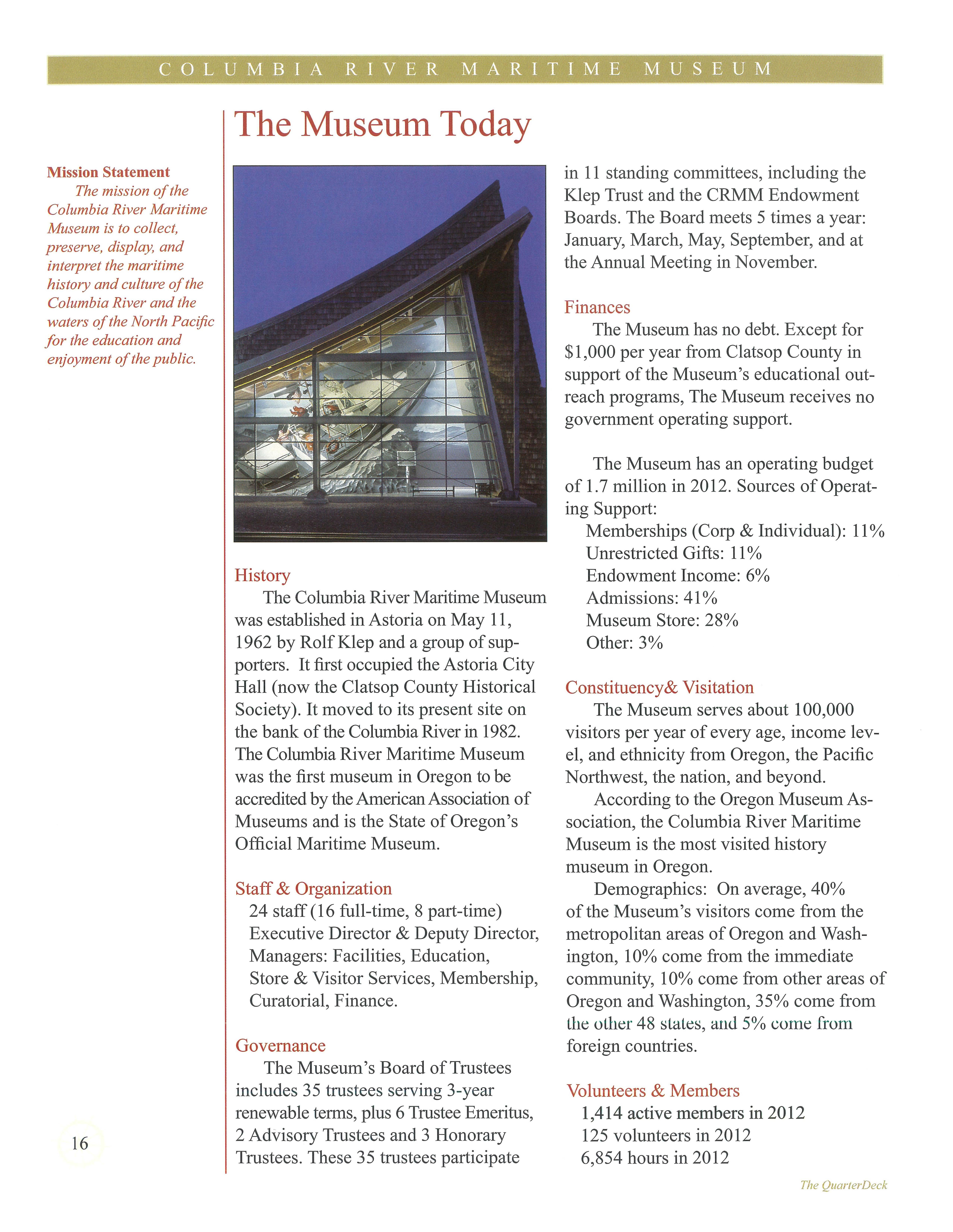
in 11 standing committees, including the Klep Trust and the CRMM Endowment Boards. The Board meets 5 times a year: January, March, May, September, and at the Annual Meeting in November.
Finances
The Museum has no debt. Except for $1,000 per year from Clatsop County in support of the Museum's educational outreach programs, The Museum receives no government operating support
The Museum has an operating budget of 1.7 million in 2012 . Sources of Operating Support:
Memberships (Corp & Individual): 11 %
Unrestricted Gifts: 11 %
Endowment Income: 6%
Admissions: 41 %
Museum Store: 28%
Other: 3%
Constituency& Visitation
The Museum serves about 100,000 visitors per year of every age, income level, and ethnicity from Oregon, the Pacific Northwest, the nation, and beyond.
According to the Oregon Museum Association, the Columbia River Maritime Museum is the most visited history museum in Oregon.
Demographics: On average, 40% of the Museum's visitors come from the metropolitan areas of Oregon and Washington, 10% come from the immediate community, 10% come from other areas of Oregon and Washington, 35% come from the other 48 states, and 5% come from foreign countries.
Volunteers & Members
1,414 active members in 2012
125 volunteers in 2012
6,854 hours in 2012
COLUMBIA RIVER MARITIME MUSEUM I
16
The Quar/erDeck
Campus & Buildings
13 acre campus with 1,400 feet of waterfront and four buildings.
Main building: 44,200 sq. ft., remodeled in 2002. Exhibition halls, offices, library, store, meeting rooms, and collection storage.
Astoria Railroad Depot: 6,500 sq. ft. Boat building and other hands-on programs.
Armory: 40,000 sq. ft . Collection storage.
Parking: Room for 138 cars and 8 large RVs and buses.
Exhibits
20,000 sq. ft. climate controlled exhibit space divided into seven themed galleries in the main building:
Fur Trade and Exploration
Mapping the Pacific Coast Fishing
Crossing the Bar
Steamboats on the Columbia Naval History Gallery
Great Hall : Coast Guard, Fishing boats, Canneries, Tugs, Barges, & Modem Shipping
The exhibits in the themed galleries are frequently rotated to allow for the installation of temporary exhibits and allow refreshment of the galleries themed material.
Recent temporary exhibits included:

Decoys of the Columbia River, The Art of Cleveland Rockwell, Tattoos : Art of the Sailor, Marking Time : Voyages to Vietnam, Mapping the Pacific Coast, 1544 - 1793 and Envisioning the World: The First Printed Maps of the World, 1472-1700.
Outdoor Maritime Displays
Lightship Columbia: Decommissioned in 1979 , 128' long, the largest artifact in the collection.
Propeller: Four blade propeller from Charles F. Adams class destroyer, 14 feet in diameter and 19,000 pounds.
Pilot Boat Peacock : 90 feet long and weighing nearly 80 tons, this specially modified North Sea rescue craft was designed for conditions on the Columbia River Bar In service for 35 years and retired in late 1999, it now greets visitors on the Museum campus.
Anchors, large stockless- type, one from a Navy battleship, the other from a 20th century cargo ship.
Jetty rock , 26 tons, similar to the rocks used to repair the North Jetty on the Columbia River.
Large Navigation buoy, 40 foot diameter buoy replaced the Lightship Columbia on station at mouth of the river.
The QuarterDeck
17
Abraham Ortelius, Flemish, 1527-1598
Typus Orbis Terrarum Antwerp, 1570
The Wendt Map Collection, a gift of Henry and Holly Wendt, comprises 29 historic maps and the journals of Captain James Cook, Sir Alexander Mackenzie and others from 1544 to 1793.

They represent the maps and charts that Thomas Jefferson used in making his decision to send Lewis and Clark on their journey of discovery. An incredible addition to the research capability of the Museum, this collection is an example of the depth and strength of the library.
Artifact Collection
40,000-plus artifacts including ship models, marine carvings, paintings, navigational instruments, fishing gear, etc.
49 boats including the following on display:
Lightship Columbia WLV-604, (on the National Historic Register).
USCG 44300, prototype surf rescue craft displayed at a dramatic, realistic 30-degree roll and pitch, simulating a Coast guard rescue in progress on the Bar.
USCG 36 foot Motor Life Boat, wood-hulled precursor to the 44-footer.
Troller Darle, built in Astoria and fished out of Depoe Bay, Oregon.
Pilot Boat Peacock: 90 feet long and weighs 80 tons. Permanently displayed on the Maritime Museum campus .
Double-ended Columbia River sailing gillnet boat replica, representing a type of craft that once numbered in the thousands, but is now extinct on the Columbia River.
1924 double-ended motorized bow-
picker gillnet boat, Astoria-built, showing the evolution of fishery methods.
Chinook canoe, representine Native American watercraft traditions. Early rowing pilot boat transfer launch, in service until 1962.
Archival Collection
One of the largest collections of maritime archival material in the Pacific Northwest.
Library: 9,000 + books, journals, logs, business records, periodicals, plans and manuscripts.
Photographs: 19,000+
Maps & Charts: Collection includes some of the earliest maps and charts of the Columbia River and adjacent ocean waters, dating from the 16th century.
Educational Programs:
Free outreach programs to elementary schools in five counties .
Guided tours for youth and adults. Curriculum trunks for elementary
COLUMBIA
MARITIME
RIVER
MUSEUM
18
VI ,HT£ ITVDO crc r. ·
The QuarlerDeck
schools.
Free publications for 4th - 6th grade students.
Hands-on Programs: Over 22,000 children & adults participated in special programs during 2011 .
The Museum provides free bus transportation for all 4th grade classes from Clatsop County visiting the Museum
In 2011, Museum education staff visited 28 schools in Tillamook, Clatsop, Columbia, Pacific and Cowlitz Counties in 157 days, presenting 758 programs to 5,322 students.
All school children in Clatsop County are admitted free to the Museum on school tours. School children from outside Clatsop County are admitted for $2 while on school tours.
Meeting Rooms & Rental Space
Rolf Klep Conference Room - Comfortable seating for up to 30 people.
Kem & Ford Rooms - 1,872 sq ft. Banquet seating for up to 120, lecture seating for 160.
Barbey Maritime Center for Research & Industry- 1,368 sq ft. Banquet seating for 90, standing room for 150. Scheduled for completion in November 2012 . The QuarterDeck
Rental rates vary depending on whether the rental is to an individual, a for-profit organization, or a non-profit organization. Space is often donated to local non-profits and community groups.
The Barbey Maritime Center for Research and Industry
The Museum is currently involved in a $2.6 million restoration of the Astoria Railroad Depot. When completed hands-on activities focusing on traditional maritime skills and trades will augment and complement existing Museum programs.
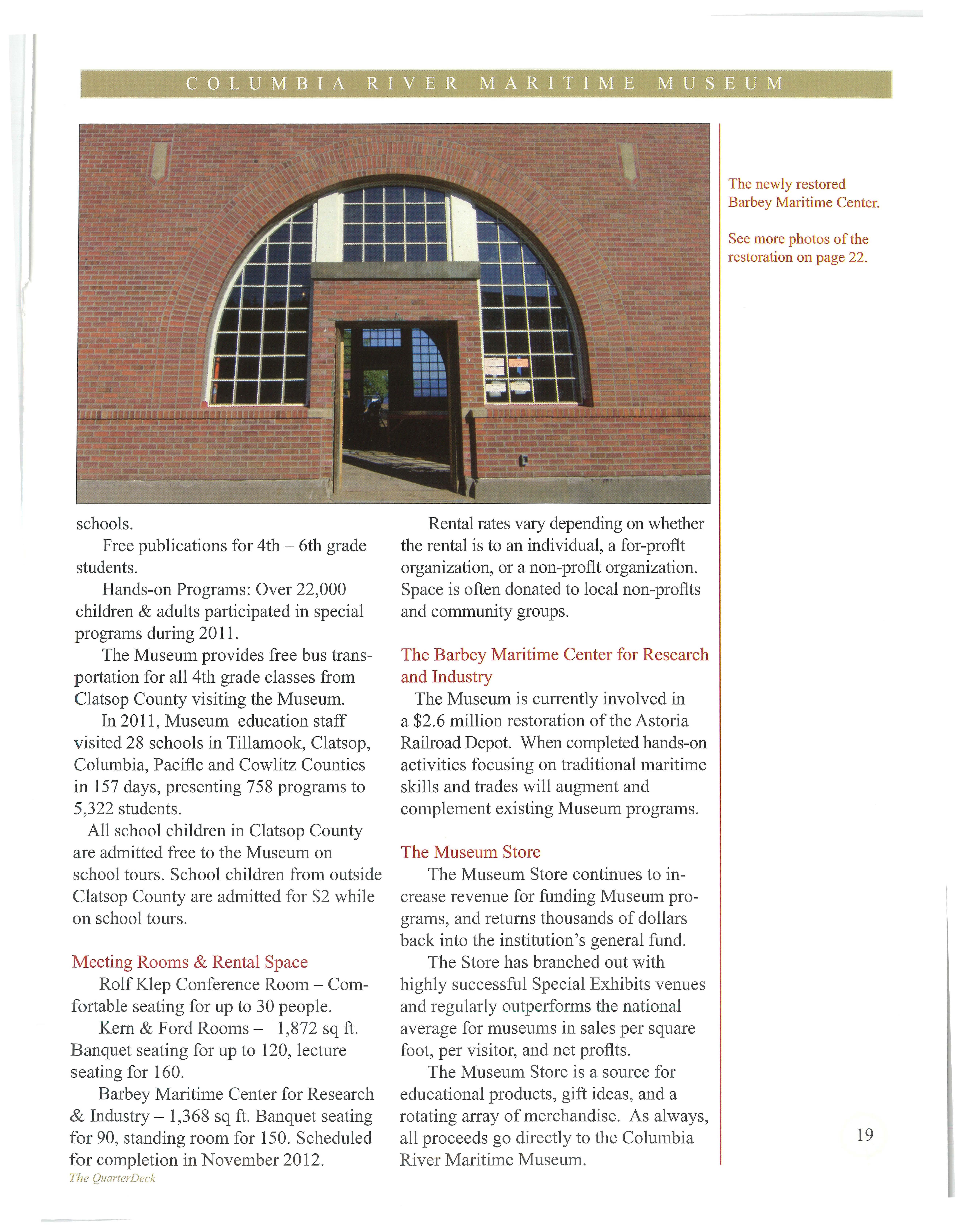
The Museum Store
The Museum Store continues to increase revenue for funding Museum programs, and returns thousands of dollars back into the institution's general fund.
The Store has branched out with highly successful Special Exhibits venues and regularly outperforms the national average for museums in sales per square foot, per visitor, and net profits.
The Museum Store is a source for educational products, gift ideas, and a rotating array of merchandise. As always, all proceeds go directly to the Columbia River Maritime Museum
!TIME
MUSEUM
The newly restored Barbey Maritime Center.
19
See more photos of the restoration on page 22.
Major supporters are those who have cumulatively given $25,000 or more to the Museum.
The list of all individuals, business, and foundations who have donated outright gifts and bequests to the Museum is a very long one.

Major Supporters of the Museum over the Years
AIMCO
Estate of Walter and Barbara Asp
The Autzen Foundation
Bank of Astoria
Anne M Barbey
Mrs Daniel E. Barbey
Mr and Mrs Graham Barbey
Bergerson Construction, Inc
Edward R and Dorothy I. Boyle
Judith and Richard Bressler
Peter J . and Noydena Brix
Estate of Mary Ella Carson Brodie
Ernest R. Brown
Bumble Bee Seafoods, Inc.
Eben H. Carruthers
Richard and Nancy Carruthers
Estate of Mary Catlin
Natalie Cellars
Ben B Cheney Foundation
Mayor and Mrs. Robert Chopping
The Clark Foundation
Clatsop County Historical Levy
Ralph W. and Susie Coe Endowment Fund
The Collins Foundation
Columbia River Bar Pilots Association
Confidence Foundation
Ward & Lois Cook
Jack and Mary Dant
Wilfred H . Dole
Kenneth G. Drucker
Robert M. Drucker Trust
Thomas V. and Cynthia R Dukich
George Marshall Eltinge Trust
Freda Englund
Jon A and Mary Jean Englund
William C. and Theresa R . Fanens
Fred and Suzanne Fields
Estate of 0. Russell Fluhrer
The Ford Family Foundation
Friends of the Columbia River Maritime Museum
Don and Grace Goodall
Verne D and Frances Gooley
Alan C Goudy
Charles and Donna M. Gustafson
Jeny F and Marilyn Gustafson
Michael E. and Melissa L. Haglund
Mr. and Mrs. W. Dennis Hall
Ted H. Halton, Jr
Mr. and Mrs John C. Hart
Don M and Carol Haskell
Mrs . Edmund Hayes
Otto and Marie Hermann
Raymond Hickey
Lorene Sails Higgins Charitable Trust
Elizabeth S. Holden
The Jackson Foundation
Samuel S. Johnson Foundation
Grace Kem
Estate of George W. Kesti
The Kinsman Foundation
Ken and Dean Kim
Mrs. Doris Klep
Rolf and Alice Klep Educational Trust
Eldon E. Korpela
Helena Barbey Lank.ton and Milt Lank.ton
H. Kirke Lathrop
Capt. Rod and Lynne Leland, USCG Ret.
Anita Barbey and Todd Liebow
Joanne M. Lilley Fund of The Oregon Community Foundation
James and Grace Mack
Donald and Veronica Magnusen
Richard H. Martin
Wenona Dyer Martin
Patrick J. and Darle Maveety
Jim and Kay McClaskey
Mr. Scott A. McCorkle
John S and Anne McGowan
Meyer Memorial Trust
James F. and Marion L. Miller Foundation
Mr and Mrs Harold A. Miller
Mr. James F. Miller
Joe Miller and Edith Henninsgaard Miller
Prudence Miller
COLUMBIA RIVER MARITIME MUSEUM
20
The QuarterDeck
Ellison C. Morgan
The M.J. Murdock Charitable Trust
L. T. Murray Family Foundation
Institute for Museum and Library Science
David M. and Anne Myers
National Endowment for the Humanities
Ted and Diane Natt
Kay North
The Nygaard Family
The Oregon Community Foundation
Pacific Power & Light Company
Pacific Power Foundation
Bob and Sandy Patterson
Estate of Rolland Payne
Quest For Truth Foundation
Peter G and Anna Quinn
James and Sharon Richards
Estate of Inez R . Sanford
Jordan and Mina Schnitzer
Shadow Funders
Mr and Mrs. George Siverson
The Snow Family
June Spence
William T.C. and Cornelia H Stevens
Stimson-Miller Foundation
Henry T. Swigert
Ann and Bill Swindells Charitable Trust
Charles and Caroline Swindells
Shawn and Paula Teevin
Mr. and Mrs . Joseph P. Tennant
Estate of Rose Tolonen
The QuarlerDeck
Cleveland Rockwell's stunning watercolor of the sunrise over Tongue Point. Columbia River Maritime collection.
Rose E. Tucker Ch a rita ble Trust
Robert C. and Cloydene E. Uhrbrand
U.S. Bank
Estate of Norman C Vielmette
Margo Grant Walsh
Mr. Bruce Ward
Gera l d L. and Margaret Warnock
Frank and Jane Warren
Mrs. John A. Warren
The Robert C and Nani S Warren Foundation
Wells Fargo Foundation
Henry and Holly Wendt
Westland Foundation
Weyerhaeuser Company Foundation

Wheeler Foundation
Mr and Mrs Coleman H. Wheeler, Jr
Mr and Mrs N Paul Whittier
Harold and Lenore Wilde
Willamette Industries , Inc.
ME MUSEUM
21
The Barbey Maritime Center for Research and Industry

Progress continues on the new Barbey Maritime Center at the old Astoria Railroad Depot.
The 2.6 mill ion dollar restoration will add a new gem to the east side of the Museum campus.
Photos courtesy of Terry Shumaker.
COLUMBIA RIVER MARITIME MUSEUM
22
The Qua r terDeck
Friends of Columbia River Maritime Museum
Women's Auxiliary, Museum Auxiliary, Friends of Columbia River Maritime Museum- the name is not important- but the group's contribution to the Museum is invaluable. Early in the Museum's history this organization was founded to assist the Museum in raising funds for projects and helping with social events.

The Friends of CRMM have donated significantly over the years. They bought the Museum's first photocopy machine, audio visual equipment, motion picture projector, and a ten-foot steel cut-out of the Museum logo designed by RolfKlep that now hangs on the east end of the building.
Orabelle Bruneau, Paula Morrow, Mary Steinbock, and Carol Prior with the design of new Museum.
Plank Owners of the Museutn
COLUMBIA RIVER MARITIME MUSEUM
ll I :\1B IJ\ R IV l : R M J\l{ITIMl Mt 1<-; 1 IJM
The QuarterDeck
Allen Cellars, Erik Hauke. Mel Hjorten, Bob Chopping, George Fulton, and Frankye Thompson representing Dick Thompson at the ground breaking for the expansion of the Museum in 2000.
23
Trustees of the Columbia River Maritime Museum

Strong leadership makes a great Museum
George Altstadt
John B. Altstadt
Richard T. Anderson
Fred L. Andrus
Victor G. Atiyeh
Thomas E. Autzen
Philip L Bainer
John A. Banholzer M D
Graham Barbey
CDR William Barney
Fred L. Barnum
George F. Beall
Diane Beeston
Nicholas Begleries
Darryl Bergerson
Deskin Bergey
Henry E Bisom
Dennis A. Bjork
Mitchell Boyce
Peter J. Brix
John R. Brooke
Ebba Brown
Charles W. Browning, MD
Bruce Buckmaster
Theodore T. Bugas
Richard T. Carruthers, Jr.
Eben Carruthers
Allen V. Cellars
Robert Chopping
Dave Christensen
Maurie D Clark
Harry L. Claterbos, Jr.
Capt. James T. Clune USCG
Retired
Morgan Coe
Ronald Collman
Ward V. Cook
William R. Cunningham
Dale Curry
Doreen Dixon Dailey
JackR Dant
Anita Decker
Capt. J. F. Desassie
Thomas V. Dukich
Dan Dutton
Joseph M. Dyer
Genevieve T. Dyer
Thomas R. Dyer
Robert. 0. Elsensohn
Axel Englund
Jon A. Englund
Kurt Englund
Dale A. Farr
Arthur Fertig
Fred W. Fields
Roland T. Fisher
Carl Fisher
Roland T. Fisher
Mike Foglia
Cheri Folk
J. W. (Bud) Forrester, Jr.
CDR Dale Foster
George C. Fulton
Walter Gadsby, Jr.
Evelyn Georges
James H. Gilbaugh, Jr., MD
Alan C. Goudy
Gilbert Gramson
Alan Green, Jr
Edith Green
George R. Grove
Jerry F. Gustafson
Michael E. Haglund
W. Dennis Hall
Jean Hallaux
Lloyd Halsan
E. H. (Ted) Halton, Jr.
Roy Hammond
Jonathan Harms
John C. Hart
Ed W. Harvey
Don M Haskell
Senator Mark 0. Hatfield
George S Hauer
Eric A Hauke III
Robert G. Hemphill
Eldred W. Hendrickson
Bill Henningsgaard
John Blake Herring
Kevin Hertig
David Hill
Melvin Hjorten
Ronald J. Honeyman
Capt. Donald H. Hughes
George H. Jackson
Glenn L. Jackson
Capt. Robert W. Johnson
CDR Robert A. Johnson
Hiram Johnson
Norris Johnson
Senator Betsy K. Johnson
Gen. J. Wilson Johnston
Richard Jones
Raymond G . Jubitz
Russell J. Keizer, MD.
Capt. Richard G Kerr
S. Kenneth Kim
RolfKlep
Helena B. Lankton
Robert C. Larson
W. Louis Larson
Hayes Patrick Lavis
Capt. Rod C. Leland , USCG Ret
Kenneth Lewis
Joanne M. Lilley
Fred A. Lindstrom
Robert Lovell
Eugene Lowe
Donald Magnusen
Chet Makinster
Chris C Maletis
Robley L. Mangold
Jack G. Marincovich
Niclaus H Marineau
Irene Martin
Thomas F. Martin
Capt. Kenneth McAlpin
James A Mcclaskey
RAdm. J. M. McClelland
Eli Mcconkey
Duane McDougall
John S McGowan
Edith Henninggaard Miller
Prudence M. Miller
Donovan F. Mitchell
Robert Mitchell
Anne Morden
Donald Morden
Clayton C. Morse
David M . Myers
Ted Natt
CDR Edward Nelson, Jr.
Richard Nelson
Capt. Mark D. Nichols
0rvo A. Nikula
Kenneth M Novak
Gordon 0 Ison
Scott Palmquist
Larry Parsons
Eldred Pentilla
Larry M. Perkins
David W. Phillips
H Roger Qualman
Capt. Edgar A Quinn
Peter Quinn
Richard G. Reiten
COLUMBIA RIVER MARITIME MUSEUM
Robley Mangold
24
Senator Betsy K. Johnson
The QuarterDeck
Capt. James E . Richards
John Rickman
Arthur A Riedel
Capt. Thron P. Riggs
RAdm. David L. Roscoe, Jr.
USCG Ret.
Virginia W. Rose
Frank E Ross
Margaret Ann Rothman
Gene Sause
Max Schafer, Sr.
Jack Schiffer
Capt. Harvey Schroeder
Roy R Seeborg
Hugh Seppa
Jim Servino
George Shaver
Charles A. Shea, III
Kenneth Simonson
Roy E. Snell
Jeanyse R. Snow
Larry V. Snyder
Mike Sorkki
June Spence
John A. Sprouse
George Stadelman
Harry M. Steinbock
Herbert N Steinmeyer
Guy C. Stephenson
William T. C. Stevens
Mary Stickney
Vernon Stratton
Harry R. Swanson, Jr.
Glenn Swift
Charles J. Swindells
Shawn Teevin
Joseph P Tennant
James B Thayer, Sr
Theodore H. Thompson
Frankye Thompson
Richard Thompson
Paul Tolonen
Willis Van Dusen
Bruce Ward
Board Chairmen of the Columbia River Maritime Museum

RolfKlep
Joseph M. Dyer
Richard T. Carruthers
J. Dan Webster
Philip L Bainer
Theodore H. Thompson
Fred L. Barnum
Ronald J. Honeyman
J. W. (Bud) Forrester, Jr.
John S. McGowan
Roland T. Fisher
John S. McGowan
Peter J. Brix
Admiral John G. (Jack) Williams, Jr. USN Ret.
Alan C. Goudy
Ward V. Cook
Ted Natt
Robley L. Mangold
Cheri Folk
Captain Rod C. Leland, USCG Ret.
Don Magnusen
Thomas V. Dulcich
H. Roger Qualman
Frank M Warren
John A. Warren
J Dan Webster
Shelly Wendt
Samuel C. Wheeler
Thomas J. White
Harold B. Wilde
Admiral John G. (Jack) Wil-
liams, Jr. USN Ret.
Rees Williams
Charles L. Wood
Oscar E. Wrausman
Bill Wyatt
Representative Wendall Wyatt
John Youell
Ted Zell
Cheri Folk
1962-1968
1968-1970
1970-1973
1973-1975
1975-1976
1976-1977
1977-1979
1979-1981
1981-1983
1983-1985
1985-1986
1986-1987
1987-1989
1989-1991
1991-1993
1993-1995
1995-1997
1997-2001
2001-2003
2003-2005
2005-2007
2007-2010
2010-Present
W. Louis Larson
COLUMBIA RIVER MARITIME MUSEUM
25
The QuarrerDeck
"What a great museum, to rival ours on the East Coast at the Smithsonian. Professionally presented with a meticulous historical presentation of the history of the Columbia River area. Worth the time & the price. What a treasure for the local area " ***** (5 stars)
Studebhawk from Woodstock, Maryland
The Museum Experience
One of the most interesting ways to follow the Museum is on the many websites where our visitors post their impressions of the Museum and how they enjoyed their visit.
Perhaps better than any claims we can make, they present an image of our institution as we mark 50 years of success:
"This is a very hands-on place for families, and so educational! My kids learned so much they can probably teach a class!" ***** (5 stars)
Timnbarbie from Grayland, WA
"Frommer's called this "one of the best museums in the state", and they are right. Well worthwhile. " ***** (5 stars)
Don H from Philadelphia, PA
"We've gone through the museum on a couple of occasions and even on the second trip were not bored - which is the mark of a good museum. The exhibits, paintings and displays are so appropriate for the Columbia River and the section of the coast around Astoria. The dangers of "crossing the bar", as shown in the museum are still as real today as they were in the days of the sailing ships and the museum well covers that part of past and present history." **** (4 stars)

Lkitnice from Pierre, SD
"The building may look small from the outside, but it's deceivingly large inside. My husband and I spent several hours at the museum, and thoroughly enjoyed it. We especially liked how the exhibits were grouped in terms of phases of the Columbia's development, from Native Americans to canneries to passenger sidewheelers. Neither of us are nautical buffs, but we enjoyed it immensely. The special exhibit on tattoos was particularly interesting and well-presented. Tip: If you show your AAA card, you'll receive a $I/person discount!" ***** (5 stars)
Snert3 from Oregon
"This museum is definitely worth a visit if you are in Astoria. It has films of ships going through the difficult waters between the Columbia River and the Pacific Ocean- that alone would be worth the price of admission. But in addition there are wonderful exhibits on the maritime history of the area." ***** (5 stars)
Abbard from Washington
"Great place to learn about the unique maritime world of the area in and around Astoria Very impressive building and displays. Amazing gift shop!" **** (4 stars)
Family7Traveler from Bellevue, WA
"Great museum. The visitor gains an understanding of the incredible forces of nature at the mouth of the Columbia River - an extremely challenging and often dangerous bar crossing. Also interesting exhibits on ships and how the river influenced life and commerce in the region." ***** (5 stars)
Houstonkar from Houston, TX
"Very informative of their local history. We learned a great deal about the shipping, canning, and fishing industry as well as many informative things about the area." **** (4 stars)
Greg W. from Colorado Springs, CO
"We spent three hours on a rainy Saturday morning in this museum and learned a ton. The exhibits are very well done, and the introductory film really set the stage for our visit." ***** (5 stars)
Blueribbon_98 from Manhattan, KS
"The centerpiece of this museum is the Columbia Lightship. Allow at least 2 hours and even then you'll only scratch the surface ."***** (5 stars)
Wxtraveler from Las Vegas, NV
COLUMBIA RIVER MARITIME MUSEUM
26
The QuarlerDeck
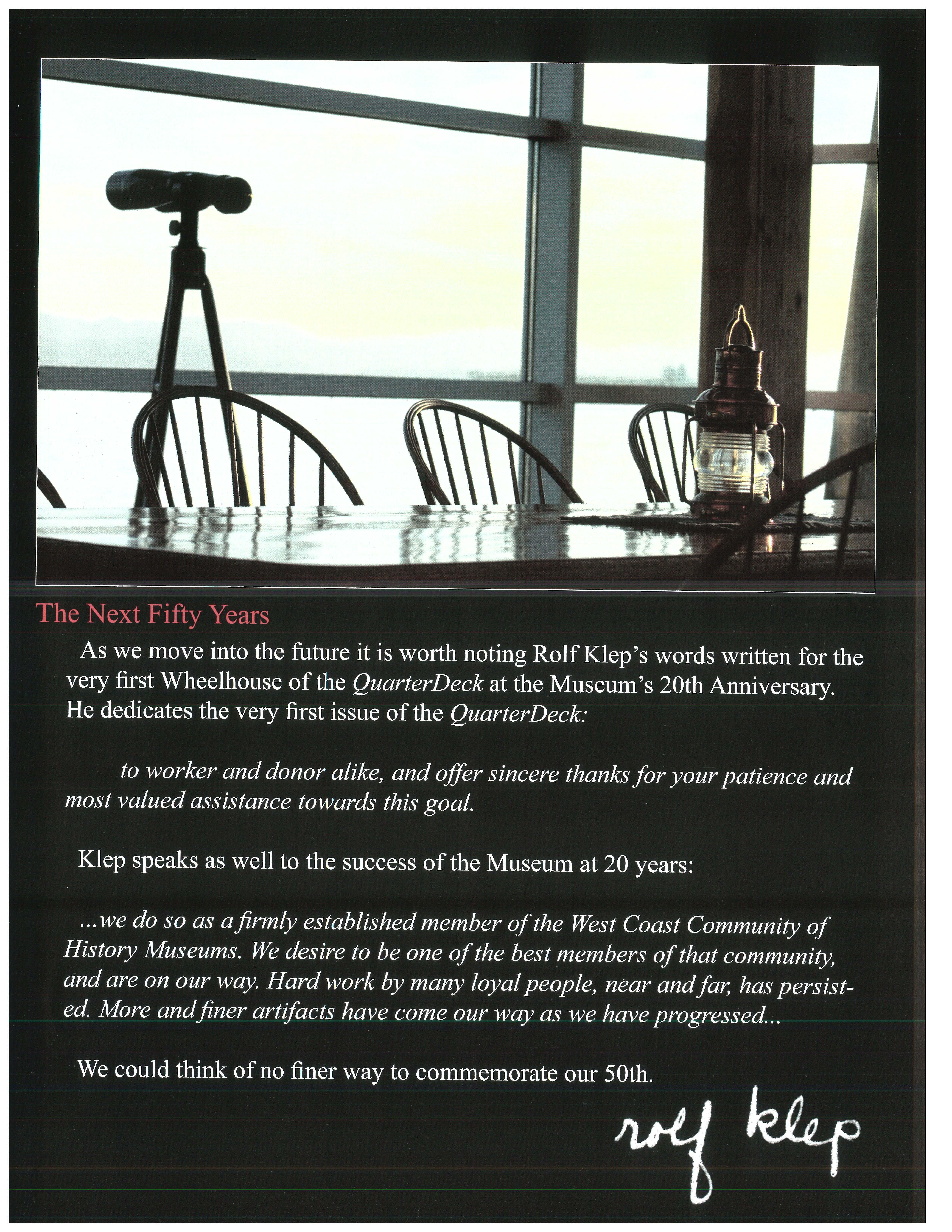


 Rolf Klep at the entrance to the maritime museum (now Clatsop County Historical Society) in September of 1967. The Museum hosted the first Regional Seminar of Historical Administration , guests included staff from the Oregon Historical Society. Columbia River Maritime Museum Collection.
Rolf Klep at the entrance to the maritime museum (now Clatsop County Historical Society) in September of 1967. The Museum hosted the first Regional Seminar of Historical Administration , guests included staff from the Oregon Historical Society. Columbia River Maritime Museum Collection.


























